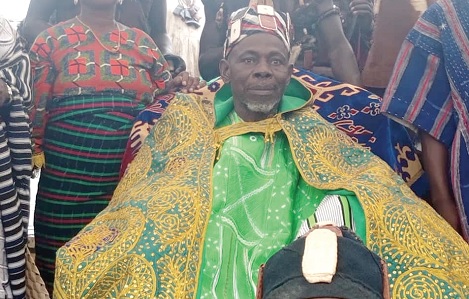The Overlord of Gonja, Yagbonwura Bii-Kunuto Jewu Soale I, has called on kingmakers of the various traditional areas in the country to ensure conflict-free chieftaincy succession in the enstoolment of paramount chiefs.
That, he said, would prevent any chieftaincy disputes after the election of a traditional ruler, particularly a paramount chief.
Yagbonwura Bii-Kunuto, who is also the President of the Savannah Regional House of Chiefs, made the call when he addressed a grand durbar of the chiefs and people of Akuapem in the Eastern Region, to mark their Odwira Festival at Akropong last Friday.
The Gonjas and the Akuapems have so many things in common, particularly a similar language, and as such, they consider themselves to belong to the same ethnic group, although the distance between the two tribes is wide.
Cultural heritage
The colourful ceremony, which was staged at Mpaniase, the forecourt of the Omanhene’s Palace, was characterised by firing of muskets, traditional dancing, blowing of horns, chanting of war songs and artistic moves portraying the rich cultural heritage of the chiefs and people of Akuapem.
The durbar was preceded by a procession of chiefs and queenmothers in palanquins, adorned in rich and captivating kente with gold ornaments to match, where the Okuapehene was carried on a palanquin through some principal streets of Akropong before arriving at the durbar grounds.
The festival, apart from remembering the ancestors, is also used to settle family disputes and contract marriages.
Dignitaries
The event with the theme: "Preserving Our Heritage: Securing Our Future, attracted hundreds of Akuapem indigenes both at home and in the diaspora, former president Nana Addo Dankwa Akufo-Addo and his entourage, some traditional rulers such as the Omanhene of the New Juaben Traditional Area, Daasebre Kwaku Boateng III, queenmothers, religious leaders, politicians, metropolitan, municipal and district chief executives (MMDCEs) and the public from all walks of life.
This year’s event has been a novelty because of the invitation of Yagbonwura Bii-Kunuto.
Chieftaincy disputes
The Yagbonwura stated that to prevent chieftaincy disputes, there was a need for the various kingdoms to lay proper lines of inheritance to ensure that royals nominated to ascend thrones would not cause trouble.
For instance, the Overlord of Gonja Kingdom indicated that there were five ruling gates of the Gonja Kingdom, and all of them had to come together to elect a paramount chief.
These gates, according to Yagbonwura Bii-Kunuto, represented the five sons of Ndewura Jakpa, who always participated in the selection and enskinment of the next Yagbonwura.
Such a process, he further indicated, prevented any disturbances often associated with the enskinment and enstoolment of new chiefs.
Neighbourliness
Regarding good neighbourliness among the tribes, Yagbonwura Bii-Kunuto said after his enskinment, he visited the Overlords of the Dagombas and Mamprusis, and that cemented the relations among them.
He therefore appealed to other paramount chiefs to visit their counterparts regularly to maintain good relations among them.
Such good relations, the Yagbonwura further indicated, would foster peace and harmony in all parts of the country, especially the traditional areas.
"Peace, as we all know, is not merely the absence of conflict; it is the very foundation upon which innovation thrives, intellect blossoms and the pillars of education, trade and industry stand firmly.
"So without peace, no community, region or nation can truly prosper. In the same vein, leadership is the engine of transformation; every success story in history has been driven by visionary, selfless and purposeful leadership, whether at home or in the community as a whole.
Donation
The Yagbonwura later donated a bull and tubers of yams to the Okuapehene. He also offered scholarships to 10 brilliant, needy students of Akuapem and allocated 100 acres of Gonja land to Akuapem to undertake large-scale farming.
Youth empowerment
The Eastern Regional Minister, Rita Akosua Adjei Awatey, asked the chiefs and people of Akuapem to rekindle their communal spirit for the development of the area as well as identify and protect their heritage, particularly songs, dance and oral traditions that defined the Odwira Festival, which must be preserved for posterity.
She stressed the need for parents to invest in the education of their children since that would empower the youth to ensure sustainable livelihoods.
The government, she indicated, would continue to invest in the education sector to ensure that every Ghanaian child, regardless of their background, would access quality education.
On illegal mining (galamsey), Mrs Awatey was happy that there was nothing like galamsey operations in the Akuapem Traditional Area and commended the Okuapehene for that.
Heritage
Earlier, the Okuapehene, Oseadeeyo Kwasi Akuffo III, stressed the need for Akuapems to identify and secure their heritage, tradition and history.
He said by identifying their history to know why they had settled in their present area, they would be able to preserve every aspect of the Akuapems, especially language, for future generations.
Concerning illegal mining in the country, the Okuapehene said although there were deposits of gold in the area, especially at Mangoase, Akuapems would not be involved in galamsey activities but would rather use the arable lands for the cultivation of food crops.
He expressed his appreciation to all, especially the Overlord of the Gonja Kingdom, for attending this year's Odwira Festival as the special guest of honour.
Writer's email: haruna.wunpini@graphic.com.gh

